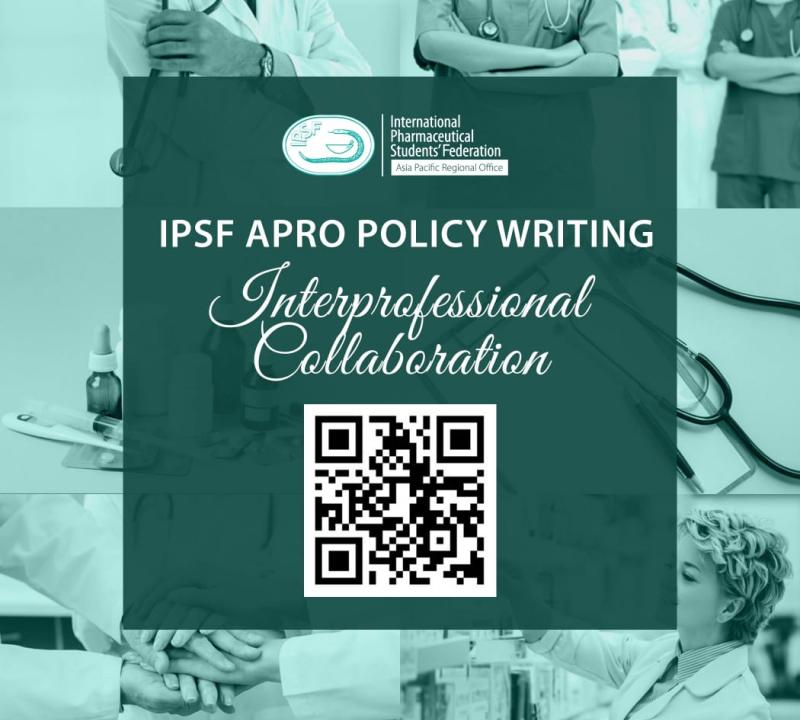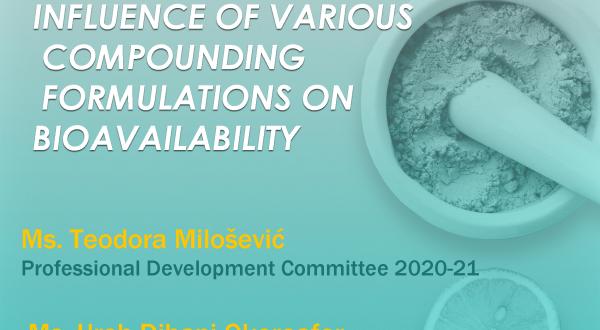
IPSF APRO Policy Writing: Interprofessional Collaboration
Interprofessional Collaboration (IPC)
The International Pharmaceutical Students’ Federation (IPSF) is a non-profit organisation that strives for public health promotion and education. IPSF is represented by over 500,000 pharmaceutical students and recent graduates in over 90 countries worldwide. The IPSF Asia Pacific Regional Office (IPSF APRO) is a functional extension of the IPSF Executive and it represents approximately 55,000 members from 18 countries in the Asia Pacific Region. IPSF APRO works collaboratively with its 28 Member Associations to raise awareness in a wide range of health topics, one of which is the collaboration between different healthcare professions.
Interprofessional Collaboration (IPC) is defined as an activity where “multiple health workers from different professional backgrounds work together with patients, families, caregivers, and communities to deliver the highest quality of care.” 1 The World Health Organization (WHO) states that with the limitation of healthcare workers, IPC is needed to improve the quality of healthcare workers.2 There are various types of health workers ranging from doctors to lab analysts. Each of these healthcare professionals have their own specialties in training that complement the skills of other healthcare professionals. With a competent team of various professionals, healthcare can be greatly improved.
As part of the health workforce, pharmacists are responsible to endeavour for the highest quality of care by collaborating with other healthcare professionals. Pharmacists should be open-minded and trusting to other healthcare workers in order to work effectively. They should be able to communicate well and respect each other in decision making to deliver patient centered care.2
To promote IPC, IPSF APRO has launched a mini game called SaveThePatients where participants can role play and learn about various healthcare professionals in order to save the ‘patient’. The roles covered in this campaign were doctors, pharmacists, nurses, mental health practitioners, and clinical laboratory analysts. IPSF APRO also made an IPC webinar with MIMS (IPSF APRO x MIMS) which welcomed representatives from each profession mentioned above, to speak on how they collaborated with other healthcare professionals in response to COVID-19. The webinar had over 5000 audiences and outreached over 30,000 people on IPSF APRO social media.
To improve IPC for APRO members, IPSF APRO plans to host more competitions and activities with other student organisations of different disciplines. Through early exposure in collaborating with other healthcare students, APRO will be equipping its members in collaborate with other healthcare professionals later on in their career. IPSF APRO also urges education systems in APRO be adjusted so that different disciplines can learn together and work together as a team. Strengthening relations with partner organisations can help both organisations to cooperate better and more efficiently.
IPSF APRO encourages all students and recent graduates to be open to new connections and collaborate with other disciplines and healthcare workers to provide patient centered care.
References
- Interprofessional Collaboration to Improve Health Care: An Introduction [Internet]. Medscape. 2016 [cited 2020 Jul 11]. Available from: https://www.medscape.org/viewarticle/857823
- Framework for Action on Interprofessional Education & Collaborative Practice Health Professions Networks Nursing & Midwifery Human Resources for Health [Internet]. Available from: https://apps.who.int/iris/bitstream/handle/10665/70185/WHO_HRH_HPN_10.3_eng.pdf?sequenc e=1
Policy Writing written by:
Mr. Spoudy Lucians
IPSF APRO Secretary Subcommittee 2019-20

Policy Writing reviewed by:
Ms. Wendy Yu-Wun Jian
IPSF APRO Secretary 2019-20




